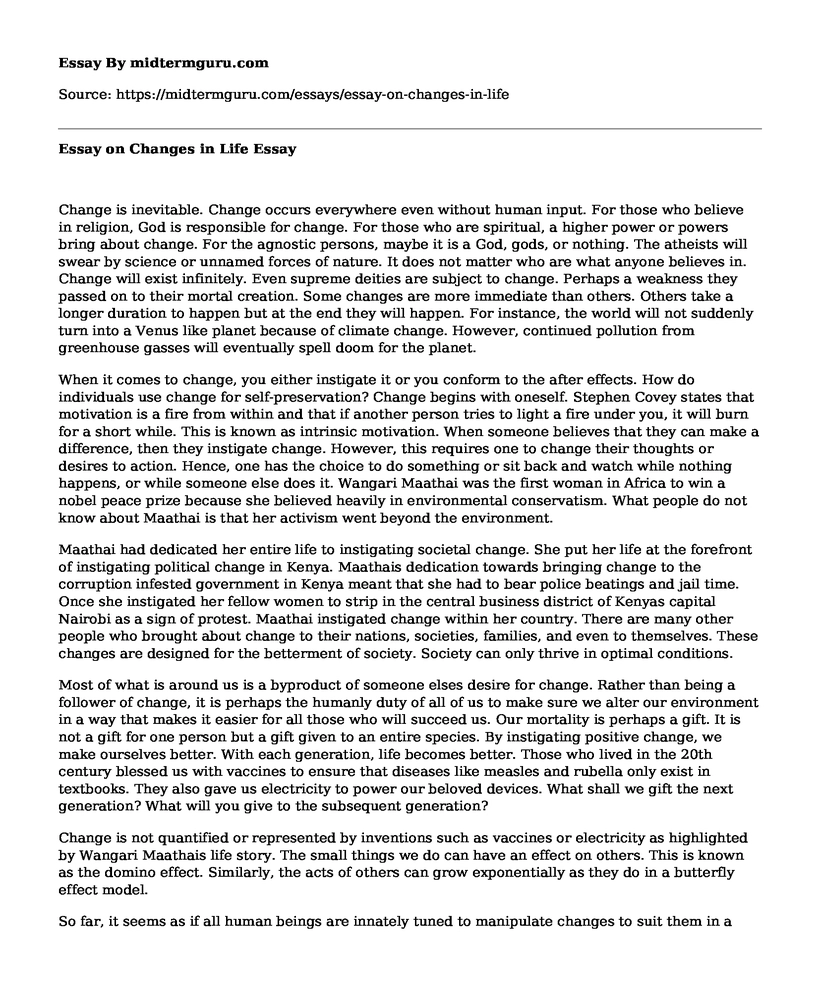Change is inevitable. Change occurs everywhere even without human input. For those who believe in religion, God is responsible for change. For those who are spiritual, a higher power or powers bring about change. For the agnostic persons, maybe it is a God, gods, or nothing. The atheists will swear by science or unnamed forces of nature. It does not matter who are what anyone believes in. Change will exist infinitely. Even supreme deities are subject to change. Perhaps a weakness they passed on to their mortal creation. Some changes are more immediate than others. Others take a longer duration to happen but at the end they will happen. For instance, the world will not suddenly turn into a Venus like planet because of climate change. However, continued pollution from greenhouse gasses will eventually spell doom for the planet.
When it comes to change, you either instigate it or you conform to the after effects. How do individuals use change for self-preservation? Change begins with oneself. Stephen Covey states that motivation is a fire from within and that if another person tries to light a fire under you, it will burn for a short while. This is known as intrinsic motivation. When someone believes that they can make a difference, then they instigate change. However, this requires one to change their thoughts or desires to action. Hence, one has the choice to do something or sit back and watch while nothing happens, or while someone else does it. Wangari Maathai was the first woman in Africa to win a nobel peace prize because she believed heavily in environmental conservatism. What people do not know about Maathai is that her activism went beyond the environment.
Maathai had dedicated her entire life to instigating societal change. She put her life at the forefront of instigating political change in Kenya. Maathais dedication towards bringing change to the corruption infested government in Kenya meant that she had to bear police beatings and jail time. Once she instigated her fellow women to strip in the central business district of Kenyas capital Nairobi as a sign of protest. Maathai instigated change within her country. There are many other people who brought about change to their nations, societies, families, and even to themselves. These changes are designed for the betterment of society. Society can only thrive in optimal conditions.
Most of what is around us is a byproduct of someone elses desire for change. Rather than being a follower of change, it is perhaps the humanly duty of all of us to make sure we alter our environment in a way that makes it easier for all those who will succeed us. Our mortality is perhaps a gift. It is not a gift for one person but a gift given to an entire species. By instigating positive change, we make ourselves better. With each generation, life becomes better. Those who lived in the 20th century blessed us with vaccines to ensure that diseases like measles and rubella only exist in textbooks. They also gave us electricity to power our beloved devices. What shall we gift the next generation? What will you give to the subsequent generation?
Change is not quantified or represented by inventions such as vaccines or electricity as highlighted by Wangari Maathais life story. The small things we do can have an effect on others. This is known as the domino effect. Similarly, the acts of others can grow exponentially as they do in a butterfly effect model.
So far, it seems as if all human beings are innately tuned to manipulate changes to suit them in a way that ensures that their species survives. If that is the truth, then why are there wars, global, social evils, and other problems such as climate change? The complexities of the human mind have led me to understand that the meaning of self-preservation is manipulated by self-interests and the interest of all beings. When an individuals self-interests supersede their level of care for other human beings then they are less likely to consider the implications of their actions on other people.
Furthermore, actions that are not designed for the long term survival of human beings are justified using economic terms. As I had earlier explained, people can either be at the forefront of change or they can take a backseat and watch it happen. Continued pollution and overexploitation of the seas means that ocean resources will be depleted. Pollution of the air has made climate change a reality. Societal inequality has meant that some people cannot access basic services. By not harnessing our capability to change, we are taking a backseat to change. Human beings are not designed to take a backseat when it comes to change. If we do take a backseat, it will be similar to watching a horror show where we are the victims and the monster will devour all of us.
Desired scenario 200
Funny 100
Conclusion
Life is only as meaningful as the amount of positive change you put into it.
Cite this page
Essay on Changes in Life. (2021, Jun 09). Retrieved from https://midtermguru.com/essays/essay-on-changes-in-life
If you are the original author of this essay and no longer wish to have it published on the midtermguru.com website, please click below to request its removal:
- Discussion on the Influence of Facebook on the Subjective Well-Being of the Users With Respect to Behavioral Adaptations
- Children Development in Different Ages - Paper Example
- Impact of Physical Activities in Nursing Adults With Mental Health and Suffering From Depression
- Critical Essay on The Global Grapevine: Why Rumors of Terrorism, Immigration, and Trade Matter
- Essay Sample on Negative Effects of Parental Depression on Dependent Children
- The Differences Between Eating Disorder and Disorder Eating - Essay Sample
- Diving Into Anxiety Disorder: A Summary of 'As Good as It Gets' - Movie Analysis Essay







